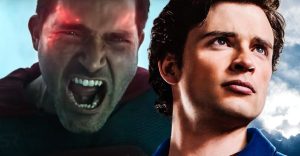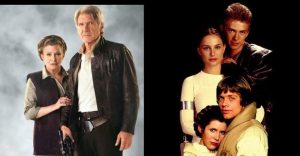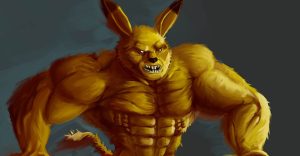Falcon & Winter Soldier Proves Tony Stark Was Wrong In Civil War

The Falcon & The Winter Soldier tacitly picks a winner in the MCU’s Civil War debate – and Steve Rogers emerges victorious over Tony Stark. Captain America: Civil War cleaves a dividing line across the landscape of the MCU. After one too many high-profile incidents of superhero recklessness, the world’s governments implement a legal framework for the ever-growing number of vigilantes hitting the streets. The resulting Sokovia Accords (named after the fictional eastern European state decimated by Ultron) made superheroes accountable to the governments of the United Nations, bringing oversight, responsibility, and legitimacy to the Avengers.
Wracked by guilt as Ultron’s creator, Tony Stark led support for the Sokovia Accords, backed by War Machine, Vision, Spider-Man, and more. Steve Rogers, however, disagreed. Captain America’s problem with the Accords wasn’t so much the extra accountability (Steve usually loves a good rule book), but the added red tape. Steve foresaw a situation where superheroes would be hamstrung by regulations, unable to help people as quickly or effectively as they usually would. With first hand experience of the Nazis, Steve also harbored reservations about relinquishing so much control to governments. Captain “America” he may be, but Steve believed the Avengers were more trustworthy not taking orders from elected officials.
The MCU never really decides which Avenger is correct. Steve wins his physical fight with Iron Man, but loses the battle to stop the Sokovia Accords being ratified into law. Then Thanos turns up and everyone has bigger intergalactic alien warlords to fry. But Falcon & Winter Soldier finally seems to choose a side, serving Tony Stark some posthumous humble pie.
Sam Wilson’s Falcon Is Exactly What The Sokovia Accords Should’ve Been

When Falcon & Winter Soldier begins, Sam Wilson is, more or less, a perfect model of the Sokovia Accords in action. There’s no mention of the law itself, but Falcon is working as a contractor for the U.S. government, operating hand-in-hand with the military. During the opening battle against Batroc, Torres warns Sam not to enter Libyan airspace, which clearly demonstrates the limits of superhero agency in the present-day MCU. Once upon a time, the Avengers wouldn’t have thought twice about national borders or hostile territories, but Falcon now has to get the job done according to the parameters of his government. The Falcon is still a “free agent,” but only so far as he’s not an active member of the military like John Walker or Battlestar. When Sam goes on missions, he’s still a fully-sanctioned representative of Uncle Sam.
For better or worse, this is precisely what the Sokovia Accords were intended to be – superheroes working under a higher authority. Falcon takes his orders from the military, and is responsible for any recklessness or wrongdoing that occurs on the job. It may not be a perfect system, but Sam Wilson is a living example that the Sokovia Accords can work. If the lawmakers’ intentions were wholesome, this should be enough for the powers that be – and yet, just as Steve Rogers predicted, it isn’t.
John Walker’s Captain America Proves Steve Rogers Was Right

Rather than being content that the likes of Falcon are finally toeing the line, the government lie to Sam and swipe his shield. Believing the trademark weapon of Captain America will be preserved in the Smithsonian, Falcon is left feeling shield-cucked when he turns on the TV and sees the disc on John Walker’s arm instead. This proves two things; firstly, governments will never be content with freelance superheroes agreeing to their rules – they want direct control and command over special individuals. Secondly, the shady manner in which Sam loses his shield proves the Sokovia Accords were never designed merely for accountability and oversight – the law was a measure to phase out vigilantes and replace them with loyal followers like John Walker, who represent a completely different set of ideals.
In Captain America: The First Avenger, Steve Rogers begins his superhero career as a glorified propaganda machine. Rather than taking down Nazis and contributing to America’s war effort, Steve spends his days punching an actor and dancing with showgirls. Sick of being a puppet, Steve strikes out and forges himself into a war hero. Alas, Cap’s original purpose has been restored thanks to John Walker. In Falcon & Winter Soldier, Walker is signing autographs, appearing on talk shows, and attending parades. He’s less Steve Rogers, more Homelander.
When Captain American’t finally does spring into action, it’s against the Flag-Smashers, but as Sam Wilson suggests during the quartet’s wonderfully awkward ride to the airport, Walker’s mission perhaps isn’t as philanthropic as it seems. While the Flag-Smashers are clearly bad guys, Wilson appreciates how the Blip has given rise to inequality. On the other hand, Walker and Battlestar sing the praises of the Global Repatriation Council and condemn the Flag-Smashers as a destabilizing factor. Is their priority to stop renegade terrorists, or quash a political uprising?
This is exactly the kind of compromised ethical stance Steve Rogers believed the Sokovia Accords could lead to. Watching Falcon swoop into battle in Falcon & Winter Soldier episode 1, Tony Stark might’ve been tempted to gloat over how smoothly the government and an Avenger were working together. Upon John Walker’s unveiling, even the great Iron Man might’ve admitted his mistake.
Isaiah Bradley Was Betrayed

Were he still alive, Tony Stark might attribute the misguided introduction of John Walker to “teething problems” as the new dynamic between superheroes and governments settles. Unfortunately for him, Falcon & Winter Soldier‘s Isaiah Bradley exposes a long and troubled history. Bradley is a super-soldier in the Captain America mold, fighting for the U.S. military during the 1950s. But after serving his country and scoring a big victory over HYDRA’s Winter Soldier, was Bradley honored for his actions? Appointed Steve Rogers’ official replacement? Not exactly. According to the man himself, Bradley was incarcerated and experimented upon by his own country, before HYDRA (who would’ve been embedded in SHIELD at this point) had their way with him too. Now freed, no one has heard of Isaiah’s deeds. Even Steve Rogers wasn’t aware of his fellow serum subject, and Bradley is left living anonymously in a run-down neighborhood.
Falcon & Winter Soldier pushes the idea that Isaiah Bradley’s treatment was racially motivated – that attitudes toward black communities in 1950s and 1960s America allowed him to be treated as a super-soldier guinea pig and discarded, unknown to the wider public. Isaiah’s story proves that governments and superheroes go together like oil and water. Before Falcon & Winter Soldier, it seemed that “lessons were learned” after Steve Rogers, but this was clearly nonsense, as the military sank to even lower depths in their pursuit of developing super-soldiers. Had Tony Stark known about Isaiah’s creation and imprisonment (and until told otherwise, we must assume he didn’t), Iron Man may not have been so quick to sign the Sokovia Accords and hand control of Avengers HQ over to Washington.
Falcon Is Being Mistreated

After forcing Steve Rogers into a propaganda role and prodding Isaiah Bradley with needles for years, surely government-superhero relations have improved in the MCU’s present day? Apparently not, as Falcon’s career as a government contractor is already getting off to a rocky start. In Falcon & Winter Soldier episode 1, Torres remarks on how Redwing’s mixture of Stark technology and multiple IP addresses made it virtually impossible to crack, but episode 2 sees Battlestar reveal that the military can pretty much use Sam Wilson’s trusty drone as a “Find My iHero.” More concerning than the tracking itself is that Falcon didn’t even know. In his support of the Sokovia Accords, Tony Stark foresaw a world where superheroes would be deployed on sanctioned missions, but it was Steve Rogers who argued that the potential for government overreach was too great. Secretly monitoring superheroes sits firmly in the “overreach” category, as the state can effectively track Sam wherever he goes, perhaps even listening to conversations through Redwing’s microphone. In the most extreme case, a military hacker could used Redwing to take out Falcon if he ever went rogue again.
Sam might be more forgiving towards this invasion of privacy if his efforts were rewarded more fairly. Falcon & Winter Soldier‘s premiere shows the Wilson family being ruthlessly turned down for a loan – but not before the banker asks Falcon to pose for a selfie. As a contractor, Falcon is getting paid for his missions, but there’s something icky about being refused financial aid after quite literally saving the universe. Again, there’s more than a hint of institutional racism at play here, but the trade-off for signing the Sokovia Accords should at least be financial security. This probably wasn’t something Tony Stark fretted about, but for the likes of Sam Wilson, playing by the government’s rules only to be treated with suspicion by bankers, policemen, etc., proves the Sokovia Accords were always weighted against superheroes. While Steve Rogers foresaw many of the issues The Falcon & The Winter Soldier raises, Tony Stark was too blinded by his guilt to predict these potential dangers.
About The Author


















